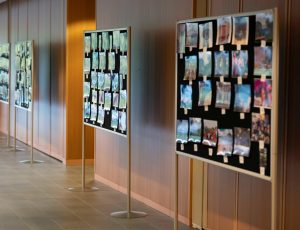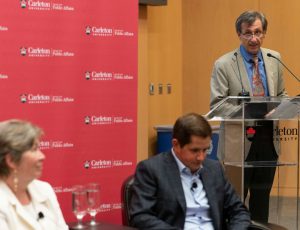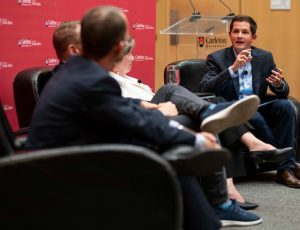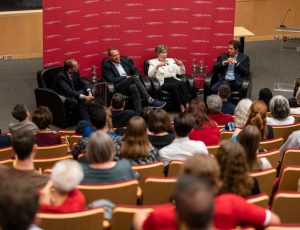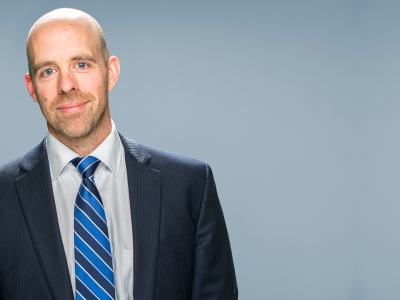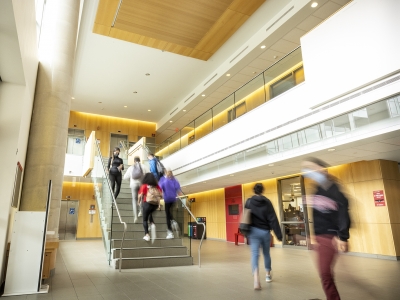By Joseph Mathieu
Photos by Chris Roussakis
Canadian voters can expect this fall’s federal election to stay focused on affordability, health care, taxes and climate change.
These “hot button issues” were discussed at the annual FPA Currents Lecture on Sept. 20, 2019. David Coletto, CEO and a founding partner of polling company Abacus Data, hosted the evening event during Carleton’s Throwback 2019.
Before the panel discussion, Coletto pointed out that Justin Trudeau’s Liberal government was elected to a majority during a time of optimism. Today, however, it seems that Canadians are feeling much more defensive.
“Do you think Canada’s headed in the right direction?” has been a polling question answered mostly positively these last four years. A turning point came on Feb. 27, 2019 when Jody Wilson-Raybould, former justice minister and attorney general, testified about the SNC-Lavalin affair before the House of Commons Justice Committee. Trudeau’s approval ratings never recovered, according to Abacus Data polls.
“Fifty per cent of Canadians today say they definitely want a change of government,” said Coletto. “Another 21 per cent say they want change, but it’s not that important to them.”
That was before photos of the Liberal leader wearing blackface makeup surfaced on Wednesday, Sept. 18.
Coletto polled 900 people before the Friday panel discussion and found that almost half of those surveyed were aware of the photos, but that 39 per cent of these people weren’t bothered by them, 37 per cent didn’t like them but felt he apologized properly, and 24 per cent were truly offended and their view of the prime minister had changed for the worse.
The question was put to the panelists: Were these photos going to change the outcome of election?
According to Tim Powers, vice-chairman of Summa Strategies and managing director of Abacus Data, the larger feeling among people seems to be that Justin Trudeau finally looked human.
“The problem for the prime minister though is less he had a human moment and more he contradicted his brand,” said Powers.
Anne McGrath, former chief of staff to Jack Layton and an associate at Hill+Knowlton Strategies, said she has vetted many candidates as an NDP strategist.
“[I have] rejected people for much less than that,” she said. “And I have also accepted candidates who have done things that a lot of people would not consider to be acceptable because they owned up to it, they apologized for it, they made retribution and they had redemption.”
Many voters make up their minds late in a campaign, said Coletto, and therefore won’t pay much attention until its final days. However, voters of different political stripes have already determined their most important issues.
Most likely to be prioritized by conservative voters are deficits and taxes, while left-leaning voters are focused on climate change and the environment. The only issue that doesn’t have a partisan divide is the cost of living.
“It almost seems like the parties are in an arms race to outbid each other for who can save you the most money,” said Coletto.
Coletto and the panel, which also included Paul Thomas, a senior research associate at the Samara Centre for Democracy, took questions from the audience. They weighed in on the power of young voters, whether foreign policy may become a hot button issue, and whether or not the leaders would discuss the controversial Quebec Bill C-21, which bans public workers from wearing religious symbols.
The panel also discussed how the federal election’s conversation could change drastically in just a few days and how this always kept pollsters very busy.
“Elections for pollsters are like 40-day-long Super Bowls,” said Coletto. “We don’t get much sleep, we have a lot of fun and, once the fourth quarter’s here, we can’t wait till it’s over.”
Friday, September 27, 2019 in Faculty of Public and Global Affairs
Share: Twitter, Facebook


